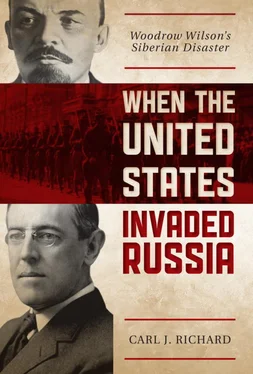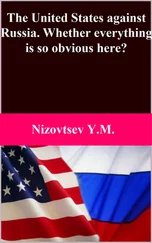Wiseman eventually succeeded in converting House, however. On June 21, House reluctantly reversed his previous, vociferous stance against Allied intervention in Siberia, writing Wilson to support it, though even then House referred to Balfour’s letter in support of the policy as “a panicky document in the main” and scoffed at his declaration that the Allies could not win the war without reviving the Eastern Front. Indeed, Balfour’s conclusion was disproved by subsequent events. [31] Link, Papers of Woodrow Wilson , Colonel Edward House to Wilson, June 21, 1918, vol. 48, 390–91.
As part of his campaign to secure American support for intervention, Wiseman also urged the British Foreign Office to stop referring to the security of India in every dispatch to America concerning the issue. Some British diplomats were so obsessed with the security of India that they justified intervention in Siberia on the incredibly dubious ground that the Germans would otherwise not only control thousands of miles of Siberian territory but invade the Indian subcontinent as well. Leaving aside the fantastic nature of this scenario, which was on a par with the fear that the Germans would transform Vladivostok into a submarine base, some American officials were understandably disturbed by the thought of intervention merely as a means of protecting British interests in India. The practice of referring to India in dispatches to America died hard, however, because it had become a subconscious part of the act of writing for so many British diplomats. [32] Fowler, British-American Relations , 167–68.
The British and French also applied a torrent of direct pressure on Wilson. As early as December 24, 1917, only two weeks after the Bolsheviks signed an armistice with the Central Powers, the Supreme War Council recommended intervention. On January 8, 1918, the French Ambassador to the United States, Jean Jusserand, began an unceasing campaign to secure Wilson’s approval for it. On January 28, the British embassy in Washington began its own campaign. Dispatches from the Allied embassies and the Supreme War Council, continuing throughout the spring, attempted to create fears in Wilson’s mind regarding the war prisoners. They failed. In late June, Lloyd George sent Wilson a memorandum written by Balfour that assured him that any fears he had of a British attempt to establish a czarist regime in Russia were completely groundless. At midnight on July 2, the Supreme War Council, which had been pressing its American representative and the U.S. War Department to support intervention, wired Wilson, strongly urging Allied intervention as vital to victory in the war against the Central Powers. This message was approved by the new Supreme Commander of Allied Forces, General Ferdinand Foch, on whose advice Wilson had already decided to send troops to northern Russia. [33] U.S. Department of State, Foreign Relations, Russia, 1918 , Jean Jusserand to Robert Lansing, January 8, vol. 2, 20–21; March 12, vol. 2, 75–77; April 8, vol. 2, 109–12; April 21, vol. 2, 128–29; April 23, vol. 2, 132–33; Lord Reading to Robert Lansing, January 28, vol. 2, 35–36; April 25, vol. 2, 135–37; April 27, vol. 2, 140; May 1, vol. 2, 148–49; Arthur Hugh Frazier to Robert Lansing, July 2–3, vol. 2, 241–46; Link, Papers of Woodrow Wilson , Jean Jusserand to Robert Lansing, March 12, 1918, vol. 47, 21–23; Jean Jusserand to Wilson, June 25, vol. 48, 415. For the texts of the Supreme War Council’s December 14, 1917, resolution and Balfour’s June memorandum, see Lloyd George, War Memoirs , vol. 6, 161–62, 177–78. These represent but a small fraction of British and French attempts to pressure Wilson into Siberian intervention.
Nevertheless, there are two flaws in Trani’s theory. The first is that Trani greatly underestimated Wilson’s level of concern about Russian affairs. Although the situation on the Western Front certainly took precedence over all else in Wilson’s thoughts, he was by no means apathetic about Russia. In fact, he was only slightly exaggerating when he wrote that he was “sweating blood” over the question of what he should do with regard to Russia, or when he wrote, “I do not know that I have ever had a more tiresome struggle with quicksand than I am having in trying to do the right thing in respect of our dealings with Russia.” [34] Link, Papers of Woodrow Wilson , Wilson to John S. Williams, February 6, 1918, vol. 46, 257.
Second, whether or not Allied pressure played a role in Wilson’s decision to intervene in Siberia, it was clearly not the decisive factor. In fact, Wilson’s advisers considered Allied thinking regarding the subject irrational. Colonel House wrote to Wilson on March 3, 1918: “The French have come to hate the Russians and do not care what befalls them and for reasons which are obvious. The English that are in power have such intense hatred for Germany that they have lost their perspective.” [35] Ibid., Colonel Edward House to Wilson, March 3, 1918, vol. 46, 518–19.
Far from intervening merely to please the British and French, Wilson was becoming exasperated with them. On June 8, Tasker Bliss wired Secretary of War Baker. In this message, shown to Wilson on June 21, Bliss wrote that he had told the other members of the Supreme War Council that “it was doing no good to fire Joint Note after Joint Note to the President, simply reiterating what they said before.” Three days later Colonel House warned a French envoy carrying a note for the president from French Prime Minister Georges Clemenceau that urged intervention not to “go into the subject in detail,” assuring him that when it came to “the old story of Japanese intervention,” the president “knew it in its every phase.” Three days later House cut off another French envoy in the midst of trying to sell intervention by telling him “that I knew every argument for and against so perfectly that I had no difficulty in repeating them in my sleep.” Since the president was in the same boat, House warned the second envoy as he had the first to keep his talk with the president regarding the subject brief. Wilson obviously appreciated these efforts by his advisers to spare him endless reiterations of the same sales pitch. On March 22, after reading a stack of British memoranda given him by Lansing, all of which advocated intervention, Wilson fired this note back at the secretary of state: “They still do not answer the question I have put to Lord Reading and to all others who argue in favor of intervention by Japan, namely, What is it to effect and how will it be efficacious in effecting it? The condition of Siberia furnishes no answer.” Until that answer came in June 1918 more than six months of persistent, intense Allied pressure accomplished nothing. [36] Ibid., Tasker H. Bliss to Newton D. Baker, June 8, 1918, vol. 48, 385; Colonel Edward House to Wilson, June 11, 1918, vol. 48, 283; Diary of Colonel Edward House, June 14, 1918, vol. 48, 317; U.S. Department of State, Lansing Papers, 1914–1920 , Woodrow Wilson to Lansing, March 22, 1918, vol. 2, 357. Wilson’s chief military advisers, Bliss and March, agreed with Wilson that intervention was militarily impracticable. See Link, Papers of Woodrow Wilson , Tasker H. Bliss to Henry P. McCain, February 19, 1918, vol. 46, 391–92; Tasker H. Bliss to Newton D. Baker, May 26, 1918, vol. 48, 181; Peyton C. March to Tasker H. Bliss, May 28, 1918, vol. 48, 182; Peyton C. March to Newton D. Baker, June 24, 1918, vol. 48, 419–21.
A fourth theory, advanced by William Appleman Williams, maintains that Wilson decided to intervene in Siberia solely in order to overthrow the Soviet government. According to Williams, “Intervention as a consciously anti-Bolshevik operation was decided upon by American leaders within five weeks of the day Lenin and Trotsky took power.” Like the North Russian intervention, the Siberian intervention “was a long-debated and long-delayed tactical move in support of the basic anti-Bolshevik strategy that had been established in December 1917.” Williams’s reference to that month was an allusion to Wilson’s short-lived proposal to offer financial aid to anti-Bolshevik general Alexey Kaledin, a plan the president quickly withdrew, Williams noted, because he feared a backlash against the Allies by the Russian people. According to Williams, Wilson considered the Bolsheviks dangerous because of their radical socialist doctrines and because the closed economic system they favored presented a threat to trade in the region. Thus, even after relinquishing his proposal to aid Kaledin, Wilson looked for ways to overthrow the Bolsheviks, finally settling on a policy of armed intervention on behalf of anti-Bolshevik forces in July 1918. Williams contended that Wilson viewed the need to overthrow the Soviet government as greater than the necessity of defeating the Central Powers. This is why, Williams maintained, Wilson declined the opportunity he was offered to cooperate with the Bolsheviks against the Germans, and it is why he deflected troops from the Western Front, at the height of the German offensive there, to destroy the Soviet government. [37] William Appleman Williams, “The American Intervention in Russia, 1917–1920,” Studies on the Left 3 (Fall 1963): 29–30, 35–36, 41–43, 47; 4 (Winter 1964): 40, 54–56. This article was published in two parts in back-to-back issues.
Читать дальше












